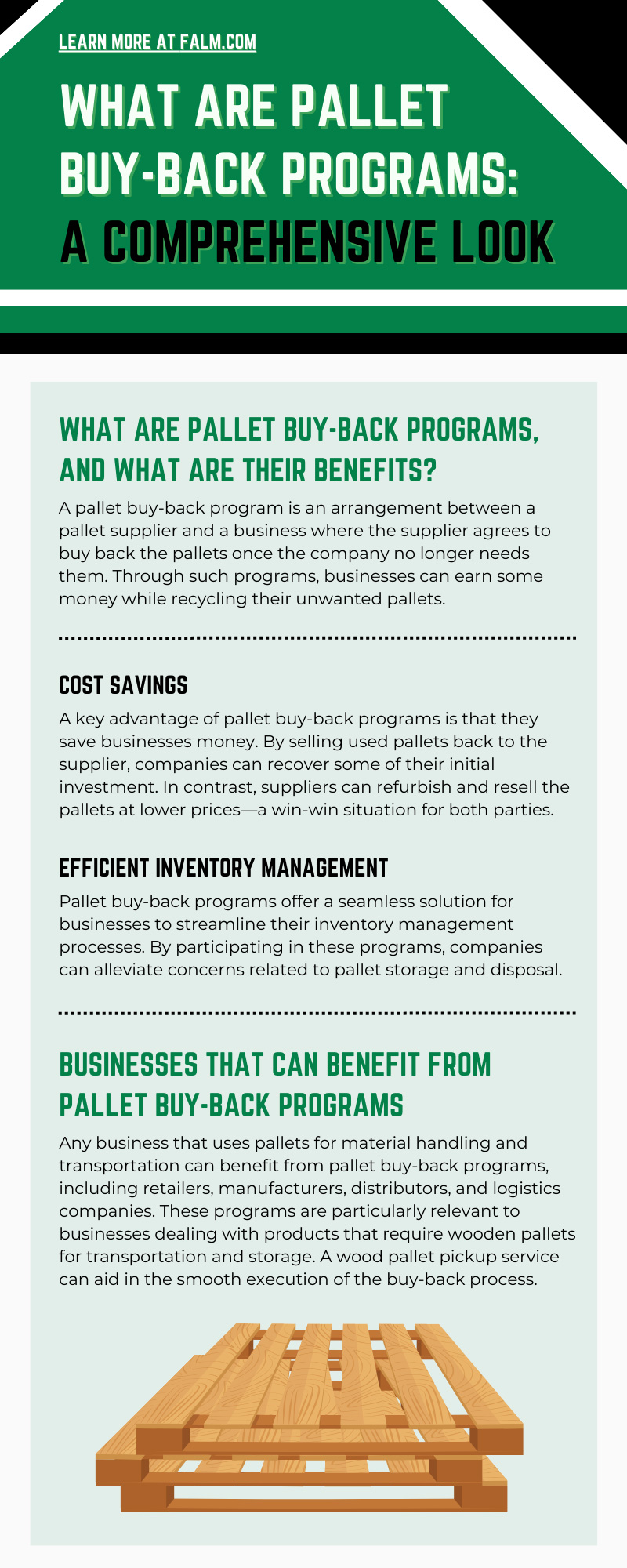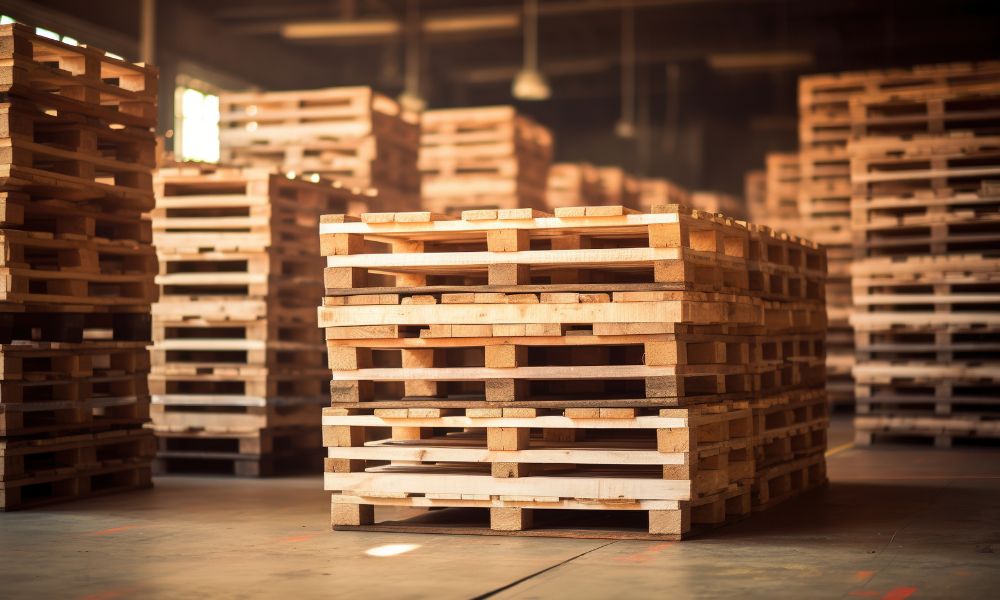- By First Alliance Logistics Management
- November 20, 2023
- Buying Pallets
Pallets play a crucial role in the transportation and storage of various products across different industries. However, what should businesses do with these pallets once they have served their purpose? Pallet buy-back programs are the simple and best answer to this question. In this comprehensive look at pallet buy-back programs, we’ll define what they are, their benefits, the types of businesses that can benefit from them, and how to implement them in your industry.
What Are Pallet Buy-Back Programs, and What Are Their Benefits?
A pallet buy-back program is an arrangement between a pallet supplier and a business where the supplier agrees to buy back the pallets once the company no longer needs them. Through such programs, businesses can earn some money while recycling their unwanted pallets.
Cost Savings
A key advantage of pallet buy-back programs is that they save businesses money. By selling used pallets back to the supplier, companies can recover some of their initial investment. In contrast, suppliers can refurbish and resell the pallets at lower prices—a win-win situation for both parties.
Efficient Inventory Management
Pallet buy-back programs offer a seamless solution for businesses to streamline their inventory management processes. By participating in these programs, companies can alleviate concerns related to pallet storage and disposal. They can sell their used pallets back to the supplier, effectively reducing surplus inventory and optimizing resource allocation. This transaction simplifies operations, contributes to cost savings, and promotes sustainable practices within the supply chain.
Environmental Sustainability
By actively participating in pallet buy-back programs, businesses play a vital role in promoting environmental sustainability. These programs encourage the reuse and recycling of pallets and contribute to reducing material waste and conserving precious natural resources. By partnering with pallet suppliers that can recycle your pallets, like a wood pallet pickup service, you can improve your environmental impact. Companies can make a positive impact on the environment and contribute to building a more sustainable future for generations to come.
Businesses That Can Benefit From Pallet Buy-Back Programs
Any business that uses pallets for material handling and transportation can benefit from pallet buy-back programs, including retailers, manufacturers, distributors, and logistics companies. These programs are particularly relevant to businesses dealing with products that require wooden pallets for transportation and storage. A wood pallet pickup service can aid in the smooth execution of the buy-back process.
Implementing a Pallet Buy-Back Program in Your Business
To successfully implement a pallet buy-back program in your business, follow the following steps.
Determine the Need for a Program
Start by thoroughly assessing your business’s pallet usage. Analyze factors such as the frequency of pallet usage, the potential for cost savings, and the environmental impact. By understanding these aspects, you can determine if implementing a pallet buy-back program would provide considerable benefits and align with your business goals. Additionally, pick a program that will match the materials you use, like a wood pallet pickup service for a company that uses wooden pallets.
Evaluate Potential Suppliers
Evaluate and compare pallet suppliers that offer buy-back programs. Look for suppliers with a proven track record, reliable customer service, and competitive pricing. Also, consider their experience in the industry and their ability to meet your specific operational requirements. Finding a reputable supplier that aligns with your budget and functional needs is crucial to the program’s success.
Establish Clear Terms and Conditions
Once you’ve chosen a supplier, you must develop a mutually beneficial agreement that outlines clear terms and conditions. Specify the pallet quality standards, pricing structure, payment terms, and other relevant details. This agreement will serve as a foundation for a successful buy-back program, ensuring transparency and fairness for both parties.
Educate Your Team
To maximize the effectiveness of the buy-back program, provide comprehensive training to your team. Train them to understand the importance of proper pallet usage and handling to avoid damage. Also, educate them on returning pallets, including any specific procedures or requirements. By equipping your team with the necessary knowledge, you can minimize errors and enable smooth operations.
Monitor and Optimize
Implement a system to regularly monitor and evaluate the success of your pallet buy-back program. Track key metrics, such as cost savings, pallet return rates, and overall efficiency. Analyze the data and identify areas for improvement. It also helps to make necessary adjustments to optimize the program, such as streamlining processes, addressing challenges, and exploring opportunities for further savings.
By following these detailed steps, you can establish a robust and effective pallet buy-back program that benefits your business and contributes to sustainability and cost efficiency.
Factors To Consider When Choosing a Pallet Buy-Back Program
Choosing the right pallet buy-back program is important for the success and growth of your business. Take the time to consider your options and choose the best program for you. This next section will cover what factors you should consider when looking for your program.
Pallet Quality
You must check that the supplier provides high-quality pallets that meet your specific operational needs. Investing in durable and reliable pallets will protect your products during transportation and enhance the efficiency and effectiveness of your overall operations. By choosing pallets that can withstand the demands of your industry, you can minimize the risk of product damage, optimize storage space, and streamline your supply chain processes.
Company Cost
When comparing buy-back prices among different suppliers, you should also consider factors such as product quality, reliability, customer service, and overall value. Evaluating these aspects allows you to make informed decisions and find the deal that meets the needs of your business and promotes long-term satisfaction and success. By considering the overall value each supplier offers, you can identify the supplier that provides the best price, quality, reliability, and customer service, maximizing the benefits for your business.
Geographical Coverage
Ensure that the chosen supplier has an extensive range in the specific areas where your business operates. Working with a company with a good range will enable seamless and efficient service delivery so that your business can effectively reach and serve its target audience across various regions. By partnering with a supplier that has a broad and reliable geographical presence, you can confidently expand your operations and cater to the needs of customers in different locations.
Company Reputation
You should also check the supplier’s track record and look at their past performance, client feedback, and testimonials. By doing so, you can confirm that they have a history of maintaining positive relationships with their clients, consistently delivering on their promises, and meeting or exceeding expectations. Taking the time to assess their reputation will help you make an informed decision and choose a reliable supplier for your needs.
Pallet buy-back programs offer various benefits to businesses, including cost savings, efficient inventory management, and environmental sustainability. By carefully evaluating potential suppliers and implementing a structured program in your business, you can reap these benefits and contribute to a more sustainable future. With the increasing focus on sustainability and responsible business practices, understanding pallet buy-back programs is essential for any business that uses pallets in its operations. If you’re looking to pair up with a good pallet supplier for a buy-back program, contact us at First Alliance Logistics Management.


